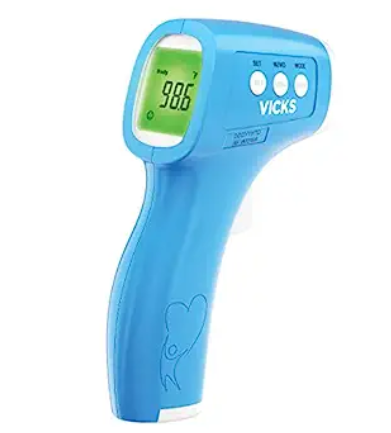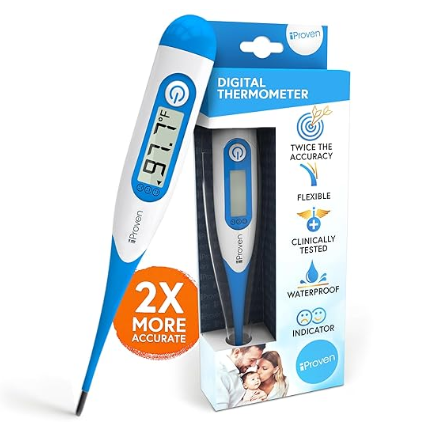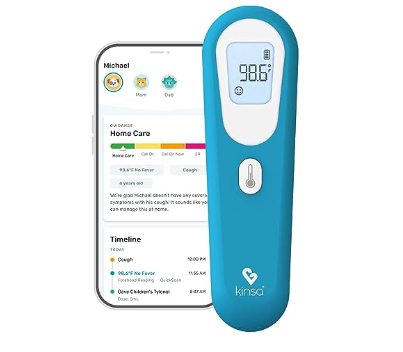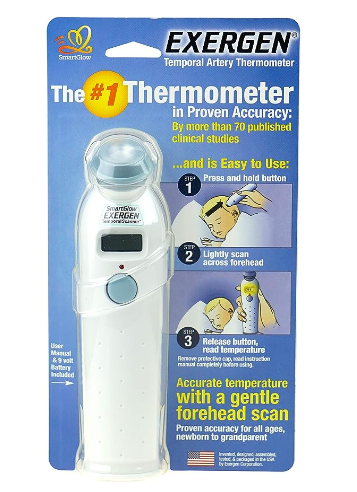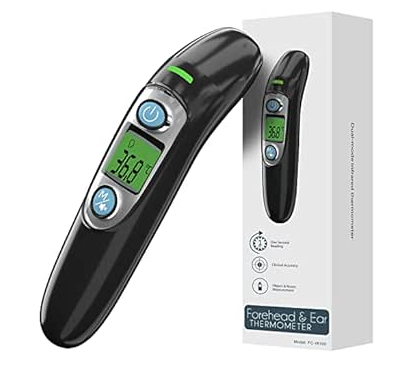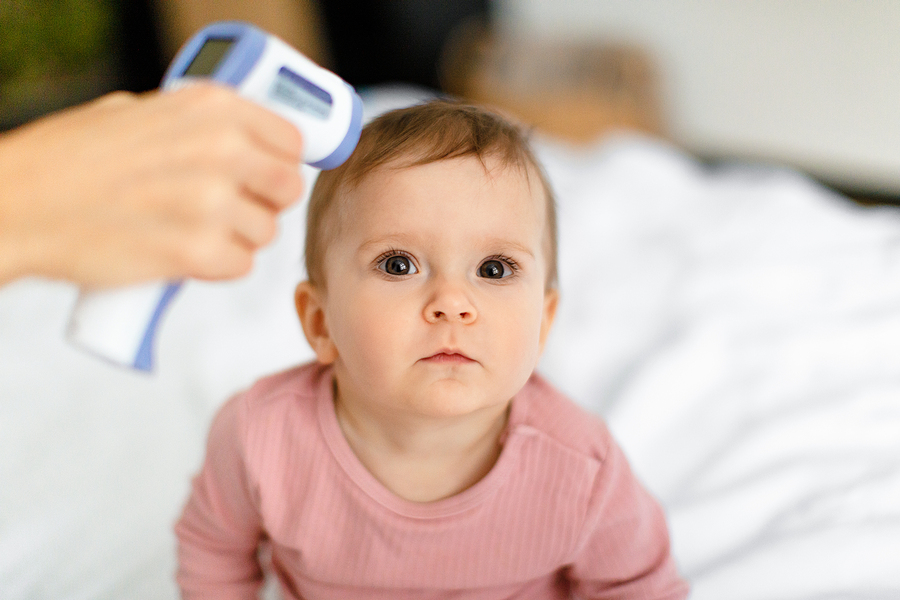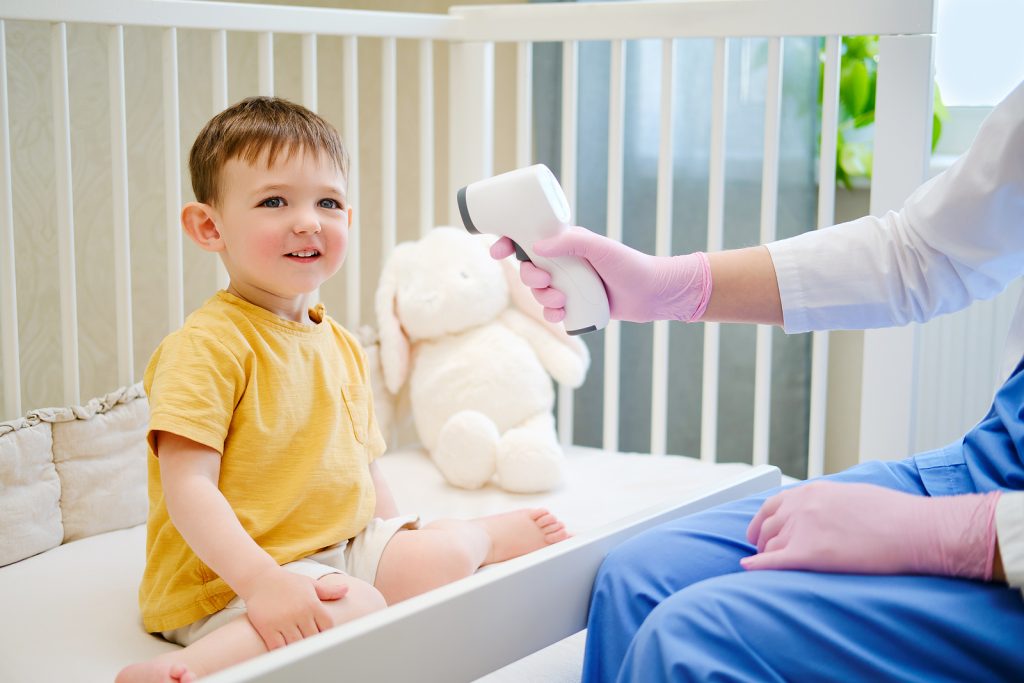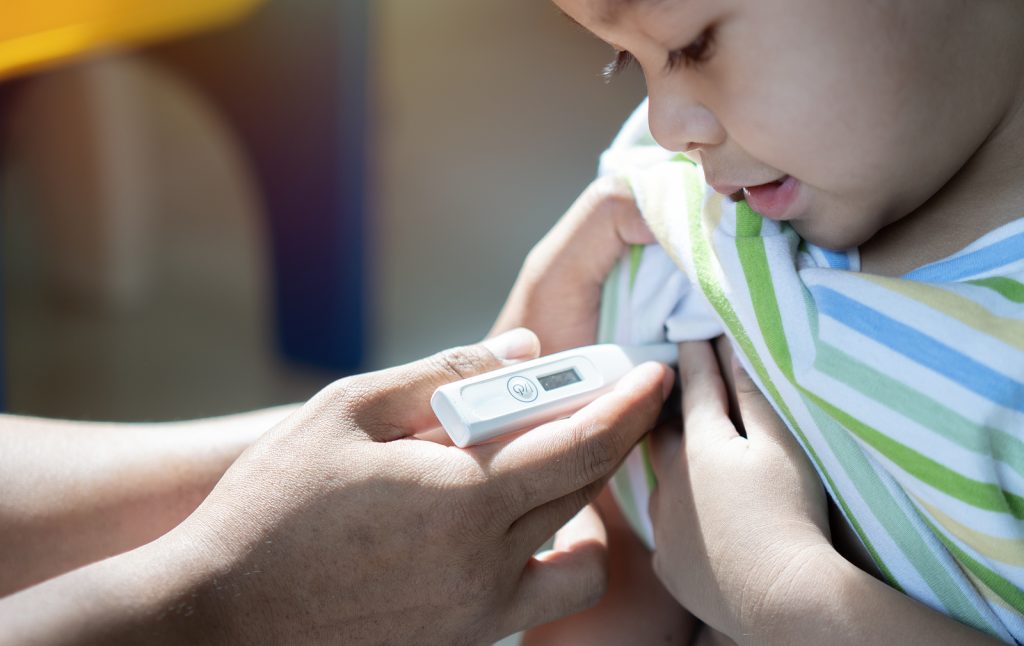Baby thermometers are an essential tool for parents and caregivers to monitor the health of infants and young children. They measure body temperature and detect fever, one of the babies’ most common signs of illness. Various types of baby thermometers are available in the market, each with advantages and disadvantages.
One of the most popular types of baby thermometers is the digital thermometer, which uses an electronic sensor to measure temperature. These thermometers are easy to use and provide accurate readings within seconds. Another type of baby thermometer is the infrared thermometer, which measures temperature by detecting the heat emitted from the baby’s forehead or ear. These thermometers are non-invasive and provide quick results, making them popular among parents.
Recommended Baby Thermometer Brands
When choosing a baby thermometer, several brands are highly recommended by parents and healthcare professionals. Here are some of the top brands to consider:
1. Braun
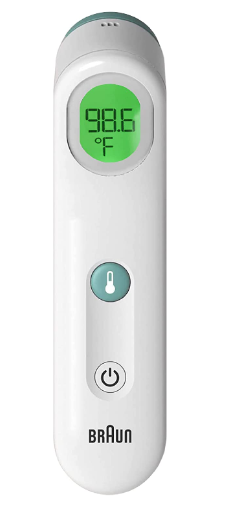
Braun is a well-known brand in the baby thermometer market, offering a range of high-quality and accurate products. One of their most popular models is the Braun Thermoscan 7, an ear thermometer that provides quick and reliable temperature readings. The Thermoscan 7 features a pre-warmed tip for added accuracy and comfort and has a guidance system to ensure proper positioning in the ear. The thermometer also includes a memory function to track temperature changes over time, making it easy for parents to monitor their child’s health
In addition to the Thermoscan 7, Braun offers other thermometers, including forehead and non-contact options. Their forehead thermometer, the Braun No Touch Plus Forehead Thermometer, uses infrared technology to provide accurate readings without needing physical contact. This makes it an excellent option for parents who want to monitor their child’s temperature without disturbing them while they sleep. Braun is a trusted brand that provides parents with reliable and easy-to-use baby thermometers.
Features:
- Age Precision Technology: This feature allows you to select your child’s age (0-3 months, 3-36 months, or 36 months and up) to ensure accurate temperature readings.
- Fast and Accurate: The thermometer provides a quick and accurate reading in seconds.
- Fever Guidance: The thermometer has a color-coded fever guidance system that helps you interpret the reading and determine if your child has a fever.
- Memory Function: The thermometer can store up to 9 previous temperature readings, allowing you to track your child’s temperature over time.
- Easy to Use: The Braun Baby Thermometer is designed to be easy to use, with a simple button interface and a large, easy-to-read display.
- Hygienic: The thermometer comes with disposable lens filters that help to prevent cross-contamination between users.
Pros:
- Braun offers a range of high-quality and accurate baby thermometers, including ear, forehead, and non-contact options.
- The Thermoscan 7 ear thermometer features a pre-warmed tip for added accuracy and comfort and a guidance system to ensure proper positioning in the ear.
- Braun’s forehead thermometer uses infrared technology to provide accurate readings without physical contact, making it an excellent option for parents who want to monitor their children’s temperature without disturbing them while they sleep.
- Many of Braun’s thermometers include memory functions to track temperature changes over time, making it easy for parents to monitor their child’s health.
Cons:
- Some parents may find that Braun’s thermometers are more expensive than other brands.
- The Thermoscan 7 ear thermometer requires disposable lens filters, which can add to the overall cost of the product.
- Some users have reported that the Thermoscan 7 can be challenging to use on squirmy or uncooperative children.
- While the forehead thermometer is a non-contact option, it may not be as accurate as ear or rectal thermometers in certain situations.
2. Vicks
The Vicks Baby Thermometer is a digital thermometer that provides accurate temperature readings for infants and young children. It features a flexible tip that makes it comfortable and safe for use in the mouth, rectum, or under the arm. The thermometer provides fast readings in 10 seconds, making it easy to use even with a fussy baby. It also has a large, easy-to-read display that shows the temperature in Fahrenheit or Celsius.
One of the standout features of the Vicks Baby Thermometer is its Fever Insight technology. This feature uses a color-coded display to help you quickly and easily interpret your child’s temperature reading. Green indicates an average temperature, yellow indicates a slightly elevated temperature, and red indicates a high fever. This helps parents and caregivers to quickly assess their child’s health and take appropriate action if necessary. The Vicks Baby Thermometer is a reliable and convenient tool for parents to monitor their children’s health and ensure they receive the proper care.
Features:
- Flexible Tip: The Vicks Baby Thermometer features a flexible tip that makes it comfortable and safe for use in the mouth, rectum, or under the arm.
- Fast and Accurate: The thermometer provides fast and accurate readings in 10 seconds, making it easy to use even with a fussy baby.
- Fever Insight Technology: The thermometer uses a color-coded display to help you quickly and easily interpret your child’s temperature reading. Green indicates an average temperature, yellow indicates a slightly elevated temperature, and red indicates a high fever.
- Memory Function: The thermometer can store up to 8 previous temperature readings, allowing you to track your child’s temperature over time.
- Easy to Use: The Vicks Baby Thermometer is designed to be easy to use, with a simple button interface and a large, easy-to-read display that shows the temperature in Fahrenheit or Celsius.
- Hygienic: The thermometer comes with a protective case and disposable probe covers that help to prevent cross-contamination between users.
Pros:
- Fast and Accurate: The thermometer provides fast and accurate readings in 10 seconds, making it easy to use even with a fussy baby.
- Fever Insight Technology: The color-coded display helps parents and caregivers quickly interpret their child’s temperature reading and take appropriate action.
- Flexible Tip: The flexible tip makes it comfortable and safe for use in the mouth, rectum, or under the arm.
- Hygienic: The thermometer comes with disposable probe covers that help prevent cross-contamination between users.
- Memory Function: The thermometer can store up to 8 previous temperature readings, allowing parents and caregivers to track their child’s temperature over time.
Cons:
- Battery Life: Some users have reported that the battery life of the thermometer is relatively short.
- Durability: Some users have reported that the thermometer is less durable than they would like and may break or malfunction after extended use.
- Calibration: Some users have reported that the thermometer may require calibration or adjustment to ensure accurate readings over time.
- Price: The Vicks Baby Thermometer may be more expensive than other thermometers on the market, which may be a drawback for some users.
- Limited Use: The thermometer is designed for infants and young children and may not be suitable for older children or adults.
3. iProven
The iProven Baby Thermometer is a digital thermometer for infants and young children. It features a flexible tip that makes it comfortable and safe for use in the mouth, rectum, or under the arm. The thermometer provides fast readings in 10 seconds, making it easy to use even with a fussy baby. It also has a large, easy-to-read display that shows the temperature in Fahrenheit or Celsius.
One of the standout features of the iProven Baby Thermometer is its fever alarm. This feature alerts you with a beep and a flashing screen when your child’s temperature reaches a fever level. It helps parents and caregivers quickly assess their child’s health and take appropriate action if necessary. The iProven Baby Thermometer is also waterproof, making it easy to clean and sanitize after use. It is a reliable and convenient tool for parents to monitor their child’s health and ensure they receive the appropriate care.
Features:
- Flexible Tip: The iProven Baby Thermometer features a flexible tip that makes it comfortable and safe for use in the mouth, rectum, or under the arm.
- Fast and Accurate: The thermometer provides fast and accurate readings in 10 seconds, making it easy to use even with a fussy baby.
- Fever Alarm: The thermometer alerts you with a beep and flashing screen when your child’s temperature reaches a fever level, helping parents and caregivers to quickly assess their child’s health and take appropriate action if necessary.
- Waterproof: The iProven Baby Thermometer is waterproof, making it easy to clean and sanitize after use.
- Large Display: The thermometer has a large, easy-to-read display that shows the temperature in Fahrenheit or Celsius.
Pros:
- Fast and Accurate: The thermometer provides fast and accurate readings, making it easy to use even with a fussy baby.
- Fever Alarm: The thermometer alerts you when your child’s temperature reaches a fever level, helping parents and caregivers to quickly assess their child’s health and take appropriate action if necessary.
- Flexible Tip: The flexible tip makes it comfortable and safe for use in the mouth, rectum, or under the arm.
- Waterproof: The thermometer is waterproof, making it easy to clean and sanitize after use.
- Easy to Use: The iProven Baby Thermometer is designed to be easy to use, with a simple button interface and a large, easy-to-read display.
Cons:
- Battery Life: Some users have reported that the battery life of the thermometer is relatively short.
- Calibration: Some users have reported that the thermometer may require calibration or adjustment to ensure accurate readings over time.
- Limited Memory: The thermometer can only store one previous temperature reading, which may be a drawback for some users.
- Price: The iProven Baby Thermometer may be more expensive than other thermometers on the market, which may be a drawback for some users.
- Limited Use: The thermometer is designed for infants and young children and may not be suitable for older children or adults.
4. Kinsa
The Kinsa Baby Thermometer is a digital thermometer for infants and young children. It features a flexible, soft tip that makes it comfortable and safe for use in the mouth, rectum, or under the arm. The thermometer provides fast readings in 10 seconds, making it easy to use even with a fussy baby. It also has a large, easy-to-read display that shows the temperature in Fahrenheit or Celsius.
One of the standout features of the Kinsa Baby Thermometer is its ability to connect to your smartphone via Bluetooth. This allows you to track your child’s temperature over time and provides personalized guidance on caring for them when sick. The Kinsa app also includes information on illnesses and symptoms and can help you find nearby doctors and pharmacies. The Kinsa Baby Thermometer is a reliable and convenient tool for parents to monitor their children’s health and ensure they receive the appropriate care.
Features:
- Flexible Tip: The Kinsa Baby Thermometer features an adjustable, soft tip that makes it comfortable and safe for use in the mouth, rectum, or under the arm.
- Fast and Accurate: The thermometer provides fast and accurate readings in 10 seconds, making it easy to use even with a fussy baby.
- Bluetooth Connectivity: The thermometer can connect to your smartphone via Bluetooth, allowing you to track your child’s temperature over time and receive personalized guidance on how to care for your child when they are sick.
- Large Display: The thermometer has a large, easy-to-read display that shows the temperature in Fahrenheit or Celsius.
- Kinsa App: The Kinsa app provides information on illnesses and symptoms and can help you find nearby doctors and pharmacies.
Pros:
- Bluetooth Connectivity: Connecting to your smartphone via Bluetooth allows you to track your child’s temperature over time and receive personalized guidance on caring for them when sick.
- Fast and Accurate: The thermometer provides fast and accurate readings, making it easy to use even with a fussy baby.
- Flexible Tip: The relaxed, soft tip makes it comfortable and safe for use in the mouth, rectum, or under the arm.
Cons:
- Price: The Kinsa Baby Thermometer may be more expensive than other thermometers on the market, which may be a drawback for some users.
- Bluetooth Connectivity: Some users have reported issues with Bluetooth connectivity, which may be a drawback for those who rely on this feature.
- Limited Use: The thermometer is designed for infants and young children and may not be suitable for older children or adults.
- Battery Life: Some users have reported that the battery life of the thermometer is relatively short.
- Calibration: Some users have reported that the thermometer may require calibration or adjustment to ensure accurate readings over time.
5. Exergen
The Exergen Baby Thermometer is a digital thermometer for infants and young children. It features a gentle, non-invasive forehead scan that is quick and easy to use. The thermometer provides fast readings in seconds, making it easy to use even with a fussy baby. It also has a large, easy-to-read display that shows the temperature in Fahrenheit or Celsius. The Exergen Baby Thermometer is a reliable and convenient tool for parents to monitor their children’s health and ensure they receive the appropriate care.
One of the standout features of the Exergen Baby Thermometer is its patented TemporalScanner technology. This technology allows you to take accurate temperature readings by scanning the forehead, which is less invasive and more comfortable for young children. The thermometer also has a memory function that can store up to 8 previous temperature readings, allowing you to track your child’s temperature over time. The Exergen Baby Thermometer is a reliable and convenient tool for parents and caregivers to monitor their child’s health and ensure they receive the appropriate care.
Features:
- Non-Invasive Forehead Scan: The Exergen Baby Thermometer features a gentle, non-invasive forehead scan that is quick and easy to use.
- Fast and Accurate: The thermometer provides quick readings in seconds, making it easy to use even with a fussy baby.
- Patented TemporalScanner Technology: This technology allows you to take accurate temperature readings by scanning the forehead, which is less invasive and more comfortable for young children.
- Memory Function: The thermometer can store up to 8 previous temperature readings, allowing you to track your child’s temperature over time.
- Large Display: The thermometer has a large, easy-to-read display that shows the temperature in Fahrenheit or Celsius.
Pros:
- Non-Invasive Forehead Scan: The gentle, non-invasive forehead scan is less invasive and more comfortable for young children.
- Fast and Accurate: The thermometer provides quick readings, making it easy to use even with a fussy baby.
- Patented TemporalScanner Technology: The technology allows you to take accurate temperature readings by scanning the forehead.
- Memory Function: The thermometer can store up to 8 previous temperature readings, allowing you to track your child’s temperature over time.
- Easy to Use: The Exergen Baby Thermometer is designed to be easy to use, with a simple button interface and a large, easy-to-read display.
Cons:
- Price: The Exergen Baby Thermometer may be more expensive than other thermometers on the market, which may be a drawback for some users.
- Limited Use: The thermometer is designed for infants and young children and may not be suitable for older children or adults.
- Calibration: Some users have reported that the thermometer may require calibration or adjustment to ensure accurate readings over time.
- Battery Life: Some users have reported that the battery life of the thermometer is relatively short.
- Limited Memory: The thermometer can only store up to 8 previous temperature readings, which may be a drawback for some users.
6. Metene
The Metene Baby Thermometer is designed for infants and young children. It features a flexible, soft tip that makes it comfortable and safe for use in the mouth, rectum, or under the arm. The thermometer provides fast readings in 10 seconds, making it easy to use even with a fussy baby. It also has a large, easy-to-read display that shows the temperature in Fahrenheit or Celsius.
One of the standout features of the Metene Baby Thermometer is its fever alarm. This feature alerts you with a beep and a flashing screen when your child’s temperature reaches a fever level. It helps parents and caregivers quickly assess their child’s health and take appropriate action if necessary. The Metene Baby Thermometer is also waterproof, making it easy to clean and sanitize after use. It is a reliable and convenient tool for parents to monitor their child’s health and ensure they receive the appropriate care.
Features:
- Flexible Tip: The Metene Baby Thermometer features an adjustable, soft tip that makes it comfortable and safe for use in the mouth, rectum, or under the arm.
- Fast and Accurate: The thermometer provides quick readings in 10 seconds, making it easy to use even with a fussy baby.
- Fever Alarm: The thermometer alerts you with a beep and flashing screen when your child’s temperature reaches a fever level, helping parents and caregivers to quickly assess their child’s health and take appropriate action if necessary.
- Waterproof: The Metene Baby Thermometer is waterproof, making it easy to clean and sanitize after use.
- Large Display: The thermometer has a large, easy-to-read display that shows the temperature in Fahrenheit or Celsius.
Pros:
- Fever Alarm: The thermometer alerts you when your child’s temperature reaches a fever level, helping parents and caregivers to quickly assess their child’s health and take appropriate action if necessary.
- Flexible Tip: The relaxed, soft tip makes it comfortable and safe
- Waterproof: The thermometer is waterproof, making it easy to clean and sanitize after use.
- Easy to Use: The Metene Baby Thermometer is designed to be easy to use, with a simple button interface and a large, easy-to-read display.
Cons:
- Battery Life: Some users have reported that the battery life of the thermometer is relatively short.
- Calibration: Some users have reported that the thermometer may require calibration or adjustment to ensure accurate readings over time.
- Limited Memory: The thermometer can only store one previous temperature reading, which may be a drawback for some users.
- Price: The Metene Baby Thermometer may be more expensive than other thermometers on the market, which may be a drawback for some users.
- Limited Use: The thermometer is designed for infants and young children and may not be suitable for older children or adults.
Understanding Baby Thermometers
When taking a baby’s temperature, it’s essential to have a reliable and accurate thermometer. Several baby thermometers are available, each with its benefits and drawbacks. Here’s a breakdown of the most common types of baby thermometers:
- Digital Thermometers – Digital thermometers are the most popular type of baby thermometer because they’re easy to use, accurate, and provide quick results. They can be used orally, rectally, or under the armpit. Some digital thermometers also come with additional features like fever alarms and memory recall.
- Ear Thermometers – Ear thermometers are another popular option for taking a baby’s temperature. They’re quick and easy to use but can be less accurate than other thermometers. Ear thermometers work by measuring the infrared heat waves emitted by the eardrum.
- Forehead Thermometers – Forehead thermometers are non-invasive and easy to use. They work by measuring the heat waves emitted by the temporal artery in the forehead. However, they can be less accurate than other thermometers and may not work well for babies under three months old.
- Pacifier Thermometers – Pacifier thermometers are designed to take a baby’s temperature while they suck on a pacifier. They’re easy to use and non-invasive but can be less accurate than other thermometers and may not work well for fussy babies.
- Mercury Thermometers – Mercury thermometers are no longer recommended for use with babies due to the risk of mercury exposure and poisoning. If you have an old mercury thermometer, it’s best to dispose of it properly and switch to a digital or another type of thermometer.
Overall, the best type of baby thermometer for you will depend on your preferences and needs. Choosing a thermometer that is easy to use, accurate, and reliable is essential. Always follow the manufacturer’s instructions for properly using and cleaning your thermometer.
Types of Baby Thermometers
- Digital Thermometers – Digital thermometers are one of the most common baby thermometers. They are easy to use and provide accurate readings. These thermometers use electronic heat sensors to measure the mouth, rectum, or armpit temperature. They are also available in various shapes and sizes, including oral, rectal, and underarm.
- Infrared Thermometers – Infrared thermometers are non-contact thermometers that measure the body’s temperature by detecting the heat emitted by the skin. They are easy to use and provide quick and accurate readings. They are also available in various shapes and sizes, including handheld and forehead.
- Ear Thermometers – Ear thermometers are also known as tympanic thermometers. They measure the ear canal’s temperature by detecting the eardrum’s infrared radiation. They are easy to use and provide quick and accurate readings. However, they may not be suitable for babies with ear infections or earwax buildup.
- Pacifier Thermometers – Pacifier thermometers are designed to measure the temperature of the baby’s body while they suck on the pacifier. They are easy to use and provide accurate readings. However, they may not be suitable for babies who do not like pacifiers or are too young to use them.
In summary, various baby thermometers are available in the market, including digital, infrared, ear, and pacifier thermometers. Each class has advantages and disadvantages; parents should choose the one that best suits their needs and preferences.
How to Use a Baby Thermometer
A baby thermometer can be a quick and easy way to determine if your baby has a fever. Here are some guidelines on how to use a baby thermometer properly:
Proper Placement
It is essential to place the thermometer in the correct location to get an accurate reading. There are several types of baby thermometers, including rectal, oral, ear, and forehead. Here are some tips for proper placement:
- Rectal thermometer: Apply a small amount of lubricant to the thermometer’s tip and gently insert it about half an inch into the baby’s rectum. Hold the thermometer until it beeps or the reading is complete.
- Oral thermometer: Place the thermometer under the baby’s tongue and instruct them to keep their mouth closed until the reading is complete.
- Ear thermometer: Gently insert the thermometer into the baby’s ear canal and hold it until it beeps or the reading is complete.
- Forehead thermometer: Place the thermometer on the baby’s forehead and move it around until you find the spot that gives the most accurate reading.
Reading the Results
Different types of thermometers will have different ways of displaying the results. Here are some general guidelines for interpreting the results:
- Rectal thermometer: An average temperature range for a baby is between 97.9°F and 100.4°F. If the reading is higher than 100.4°F, the baby may have a fever.
- Oral thermometer: An average temperature range for a baby is between 95.9°F and 99.5°F. If the reading is higher than 99.5°F, the baby may have a fever.
- Ear thermometer: An average temperature range for a baby is between 97.5°F and 100.4°F. If the reading is higher than 100.4°F, the baby may have a fever.
- Forehead thermometer: An average temperature range for a baby is between 97.5°F and 100.4°F. If the reading is higher than 100.4°F, the baby may have a fever.
Safety Measures
When using a baby thermometer, it is essential to follow some safety measures to avoid injury or infection:
- Clean the thermometer before and after each use with rubbing alcohol or soap and water.
- Do not use the same thermometer for oral and rectal readings.
- Do not leave the baby unattended while taking their temperature.
- Please do not use a glass thermometer, as it can break and cause injury.
- If the baby has a fever, consult a doctor for further treatment advice.
Following these guidelines, parents can use a baby thermometer confidently and accurately to monitor their baby’s health.
Factors to Consider When Buying a Baby Thermometer
When buying a baby thermometer, several factors must be considered to ensure you choose the right one for your child. Here are some of the most important factors to keep in mind:
- Accuracy – Accuracy is the most crucial factor when buying a baby thermometer. You want to ensure that the thermometer you choose provides accurate readings, essential for monitoring your baby’s health. Look for thermometers that are clinically tested and have a high level of accuracy.
- Ease of Use – Another essential factor to consider is ease of use. You want a thermometer that is easy to use and provides quick and accurate readings. Look for thermometers that have clear instructions and are easy to read. Digital thermometers are often the easiest to use, providing fast and accurate readings without manual calibration.
- Age Suitability – Your baby’s age is also essential when choosing a thermometer. Some thermometers are designed for infants, while others are suitable for older children. Make sure you select a thermometer appropriate for your child’s age.
- Additional Features – Finally, consider any other features that you may need. For example, some thermometers come with a fever alert, which lets you know when your baby’s temperature is above a certain level. Others may have a memory function, which allows you to track your baby’s temperature over time. Consider the most important features and choose a thermometer that meets your needs.
When choosing a baby thermometer, it is essential to consider factors such as accuracy, ease of use, age suitability, and additional features. Considering these factors, you can choose a thermometer to help you confidently and easily monitor your baby’s health.
Maintaining and Cleaning a Baby Thermometer
To ensure accurate readings and prevent the spread of germs, it’s essential to maintain and clean a baby thermometer properly. Here are some tips for doing so:
- Proper Storage – Store the thermometer in a protective case or cover to prevent damage and exposure to dirt and dust when not used. Avoid storing it in extreme temperatures or direct sunlight, which can affect accuracy.
- Cleaning – Before and after each use, clean the thermometer with a soft cloth or cotton swab dipped in rubbing alcohol or soap and water. Be sure to clean the probe area thoroughly, as this is where the thermometer comes into contact with the baby’s skin. Avoid harsh chemicals or abrasive materials, as this can damage the thermometer.
- Calibration – To ensure accurate readings, it’s essential to calibrate the thermometer periodically according to the manufacturer’s instructions. This may involve adjusting the thermometer’s settings or sending it in for professional calibration.
- Battery Replacement – If the thermometer runs on batteries, replace them as needed. Follow the manufacturer’s instructions for proper battery replacement and dispose of used batteries according to local regulations.
By following these simple maintenance and cleaning tips, parents can ensure that their baby thermometer provides accurate readings and remains in good condition for years.
Common Issues and Troubleshooting
When it comes to using a baby thermometer, parents may encounter a few common issues. Here are some troubleshooting tips to help address these issues:
Issue: Inaccurate Readings
One common issue with baby thermometers is inaccurate readings. This can be frustrating and worrisome for parents, mainly if they rely on the thermometer to monitor their baby’s temperature during an illness.
Troubleshooting: Parents should use the thermometer correctly to address this issue. They should follow the manufacturer’s instructions carefully and ensure the thermometer is inserted correctly and held in place for the recommended time. If the thermometer still gives inaccurate readings, it may need to be recalibrated or replaced.
Issue: Difficulty Taking Temperature
Another issue that parents may encounter is difficulty taking their baby’s temperature. This can be particularly challenging if the baby is fussy or uncooperative.
Troubleshooting: Parents can try distracting their baby with toys or singing a song to make the process easier. They can also try taking the temperature in a different location, such as the armpit or forehead, if the baby resists having the thermometer inserted in the rectum or ear.
Issue: Broken Thermometer
Finally, a broken thermometer can be a frustrating issue for parents. This can happen if the thermometer is dropped or otherwise damaged.
Troubleshooting: If the thermometer is broken, it must be replaced. Parents should safely dispose of the broken thermometer and purchase a new one from a reputable retailer.
By following these troubleshooting tips, parents can address common issues with baby thermometers and ensure they can accurately monitor their baby’s temperature.

A Parents Guide To Fever
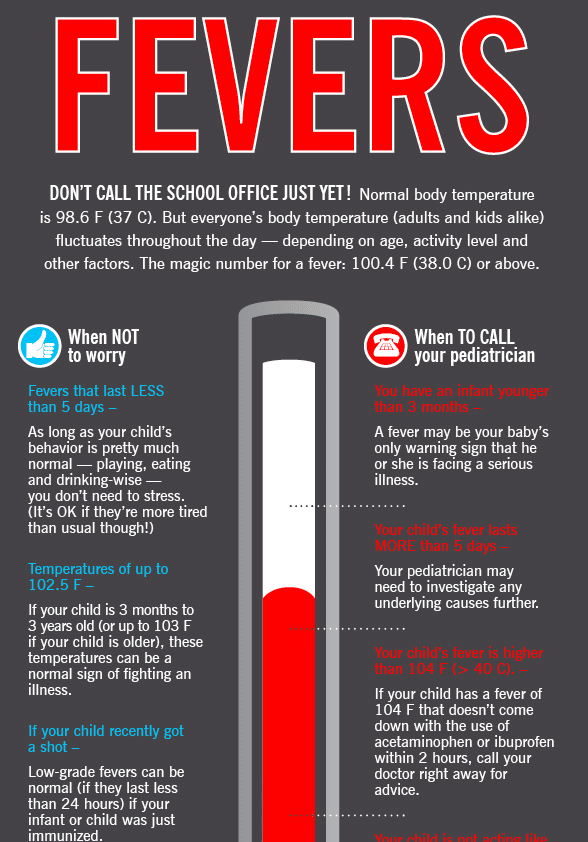
Conclusion
In conclusion, a baby thermometer is an essential tool for parents and caregivers to have on hand. It allows for accurate and reliable temperature readings, which can help detect and monitor fevers in infants and young children. When choosing a baby thermometer, it is vital to consider the different types available, such as rectal, oral, and temporal thermometers, and to choose one appropriate for the child’s age and the method preferred by the caregiver. Ensuring that the thermometer is easy to use, accurate, and reliable is also vital.
Some of the top-rated baby thermometers on the market include the iProven DMT-489, the Braun Thermoscan 7, and the Exergen Temporal Artery Thermometer. Parents and healthcare professionals have tested and reviewed these thermometers and are known for their accuracy and ease of use. Investing in a high-quality baby thermometer is wise for any parent or caregiver. It provides peace of mind and allows for quick and accurate temperature readings, which can be crucial in detecting and monitoring fevers in young children.


